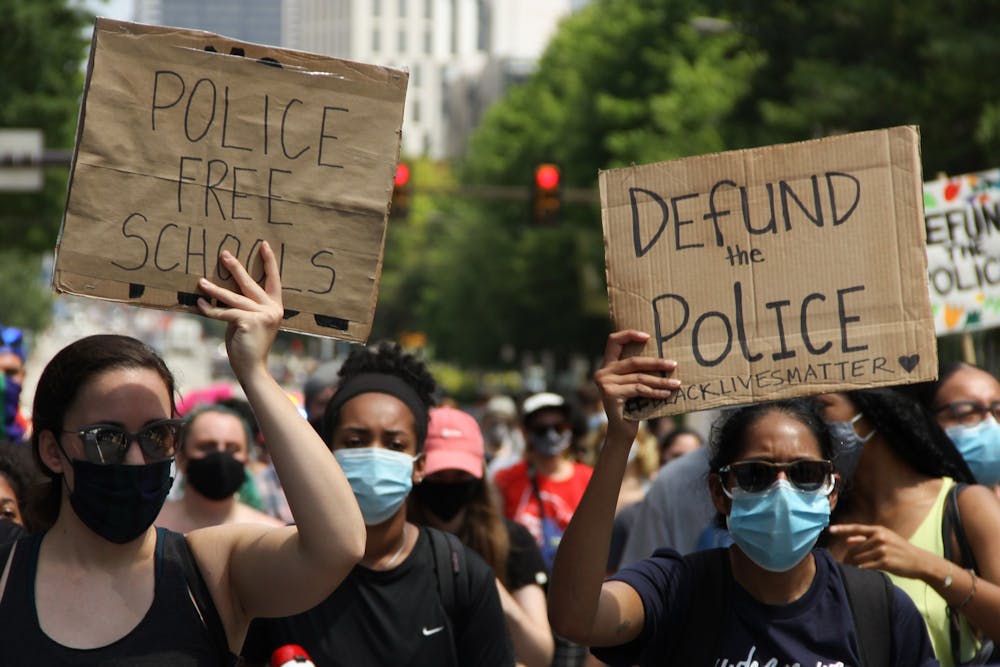
Police Free Penn held a protest on July 24 in front of the Penn Police Department headquarters, holding banners listing the organization‘s mission and demands.
Credit: Kylie CooperPolice Free Penn held an online event called “Penn Is Police" on Sept. 3, the first in a series of teach-ins, or informal lectures, meant to enlighten the Penn community about the police abolition movement and Penn's role in West Philadelphia and the carceral system.
Speakers from Penn and the West Philadelphia community gathered on Zoom to discuss Penn's role in the neighborhood and advocate for police abolition at the University.
Police Free Penn has been organizing rallies, campaigns, and other events promoting police abolition at Penn since it formed in June of this year. The group defines itself as "an assembly aiming to abolish policing and transform community safety at the University of Pennsylvania," and it plans to continue to host teach-ins throughout the semester. Some of PFP's general goals include defunding and disbanding the Penn Police department, as well as having Penn re-invest in community-controlled funds, particularly in West Philadelphia.
Noam Keim, who is a program manager at the Center for Carceral Communities, a nonprofit attached to the Penn School of Social Practice and Policy, said the group hopes the series helps people understand the magnitude of Penn's power as an institution, beyond its police presence.
The event started with talks from three speakers and continued as a panel among the speakers and Keim, who moderated the event.
Jeff Copeland, a member of the Center and a current Penn graduate student set to finish his master’s degree in Social Work next year, spoke first. Copeland discussed the time he spent incarcerated from 2007 to 2011, how he decided to pursue a bachelor’s degree in criminal justice following his release, and how these experiences led him to pursue a masters in social work at Penn.
"I really didn’t want to be on that side, the punitive side. I wanted to be on the side that was helping the folks," he said.
Police Free Penn was one of the organizers for the Aug. 9 “March on ‘University City’” demonstration, which called on Penn and Drexel University to defund and disband their police departments.
Copeland said he would have felt more comfortable at the University if it had offered more courses about mass incarceration and talks and lecture series about criminal justice systems or with formerly incarcerated individuals.
“There was this eliteness that I just never connected to," Copeland said about his experience at Penn. "That’s not to speak negatively about Penn at all; I got a great education and I had a wonderful time there, I just never felt complete."
West Philadelphia resident James Clausell also spoke at the event. After serving 36 years in prison, Clausell said he realized that “the occupying force of Penn Police has been indistinguishable from [Philadelphia] police,” expanding beyond campus and into the community. He criticized the school's "tacit disregard" of the West Philadelphia community, and said Penn has been like a colonizer in its relationship with its residents.
“To see how Penn is expanding into West Philadelphia, look at Penn Police and how their outreach expands into West Philadelphia,” Clausell added.
The event's last speaker was Gus Grannan, a member of Project SAFE, a harm reduction organization that works with people involved in Philadelphia street economies like sex work and drug use. Grannan mentioned that the city has long had the highest per capita death rate due to drug overdose in the United States. He also discussed harmful ways in which the police treat sex workers and drug users, normalizing racial profiling and violence against sex workers.
“I don’t think it will surprise you to find out that there are Penn students who use drugs, Penn students who sell drugs, [and Penn students] who do sex work. Just because we don’t have an office in West Philly and do outreach there, doesn’t mean that it’s not happening. We don’t have the adequate supplies.” Grannan said.
Keim emphasized that Penn can be a better neighbor by sharing power and resources with the community.
“Penn doesn’t have to lead anything, it just has to support what the community is doing,” he said.
The Daily Pennsylvanian is an independent, student-run newspaper. Please consider making a donation to support the coverage that shapes the University. Your generosity ensures a future of strong journalism at Penn.
Donate



